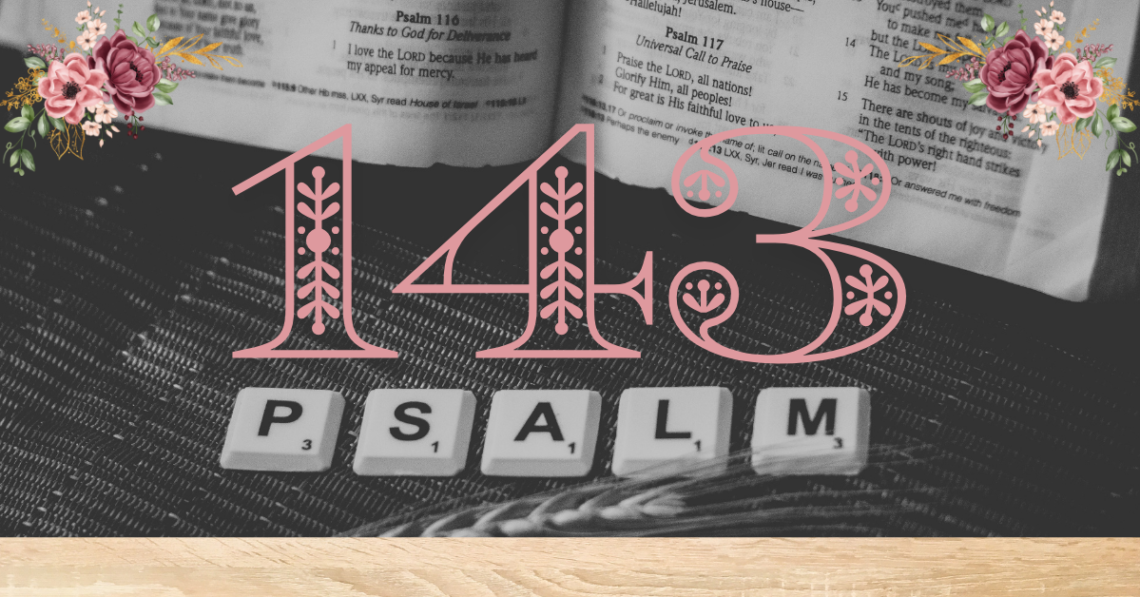Psalm 143 is a heartfelt plea from David, a man who has faced many trials and deep sorrow. Written during a time of great distress, this psalm emphasizes a cry for God’s mercy, guidance, and deliverance. David is facing both personal failure and external enemies, but he knows that only God can provide the help he so desperately needs. This psalm invites us to reflect on our own struggles and reminds us that God is our ultimate source of help and guidance.
Background of Psalm 143
This psalm is attributed to David, who wrote it during a time of personal crisis, possibly when he was fleeing from Absalom or facing persecution from Saul. The psalm expresses a deep sense of despair, but also a recognition of God’s faithfulness and a plea for His guidance and deliverance. It is often categorized as a penitential psalm, a prayer of repentance, asking for God’s mercy in light of the speaker’s failures.
What Does Psalm 143 Mean?
Psalm 143 expresses a soul in distress but holds on to the hope that God will hear and answer. David’s prayer reflects his understanding of God’s righteousness, as well as his deep need for God’s guidance to overcome his troubles. This psalm shows us how to seek God’s mercy in times of trouble and how to request His direction in our lives when we feel lost.
Verse Mapping Psalm 143:1
“Lord, hear my prayer; in Your faithfulness listen to my plea; answer me in Your righteousness.” (CSB)
Word Study
Prayer – A request or plea to God, often involving worship or petition.
Faithfulness – The quality of being loyal and true, especially to God’s promises.
Righteousness – God’s justice and moral perfection; doing what is right.
Cross-References
Psalm 54:2 – “Hear my prayer, O God; listen to the words of my mouth.”
Psalm 17:1 – “Hear a just cause, Lord; attend to my cry; listen to my prayer from lips free of deceit.”
Paraphrase
Lord, hear my prayer and respond with Your faithfulness. Answer me with Your righteous judgment.
Application
In moments of distress, we can boldly approach God, knowing that He is faithful and will respond to our cries. He is a righteous judge who hears our prayers.
Verse Mapping Psalm 143:2
“Do not bring Your servant into judgment, for no one alive is righteous in Your sight.” (CSB)
Word Study
Judgment – The act of evaluating or deciding, especially in a legal or moral sense.
Servant – A person who serves or is devoted to another; in this case, David refers to himself as God’s servant.
Righteous – Morally right or just, being in right standing with God.
Cross-References
Romans 3:10 – “There is no one righteous, not even one.”
Psalm 130:3 – “Lord, if You considered sins, Lord, who could stand? But with You there is forgiveness, so that You may be revered.”
Paraphrase
Don’t judge me according to my failures, Lord, because no one is righteous before You. We all fall short of Your perfection.
Application
Recognizing our own unrighteousness helps us approach God with humility, knowing that we depend entirely on His mercy, not on our own works.
Verse Mapping Psalm 143:3
“For the enemy has pursued me, crushing me to the ground, making me live in darkness like those who have long been dead.” (CSB)
Word Study
Enemy – An adversary or someone who opposes.
Crushing – To break or press with great force.
Darkness – A metaphor for despair, confusion, or a lack of God’s presence.
Dead – Spiritual or emotional death, a state of hopelessness or despair.
Cross-References
Psalm 22:14 – “I am poured out like water, and all my bones are disjointed; my heart is like wax, melting within me.”
Psalm 88:6 – “You have placed me in the lowest part of the pit, in the dark places, in the depths.”
Paraphrase
My enemies are chasing me, bringing me to the point of despair, leaving me in darkness, feeling as if I’m dead inside.
Application
When we face spiritual or emotional darkness, we can be assured that God sees our struggles and will provide light and life, even in our lowest moments.
Verse Mapping Psalm 143:4
“So my spirit grows weak within me; my heart is overcome with despair.” (CSB)
Word Study
Spirit – The inner self or emotional being.
Weak – Lacking strength or vitality.
Despair – A complete loss of hope, a state of utter hopelessness.
Cross-References
Psalm 77:3 – “When I remember God, I groan; when I meditate, my spirit grows faint.”
Psalm 42:5 – “Why, my soul, are you downcast? Why so disturbed within me?”
Paraphrase
I feel so weak, Lord, and my heart is overwhelmed with hopelessness and despair.
Application
In our moments of deep despair, it’s important to acknowledge our weakness and seek God’s strength. He is near to the brokenhearted and can restore hope.
Verse Mapping Psalm 143:5
“I remember the days of old; I meditate on all You have done; I reflect on the work of Your hands.” (CSB)
Word Study
Remember – To recall or bring to mind.
Meditate – To think deeply about, to reflect on.
Work of Your hands – The works and acts of God, particularly His creation and deliverance.
Cross-References
Psalm 77:11 – “I will remember the Lord’s works; yes, I will remember Your ancient wonders.”
Psalm 119:15 – “I will meditate on Your precepts and think about Your ways.”
Paraphrase
I remember the past acts of Your faithfulness, Lord. I meditate on everything You’ve done and reflect on Your mighty works.
Application
Reflecting on God’s past faithfulness helps us build trust in His future provision and deliverance. It encourages us to keep going, knowing that He is faithful.
Verse Mapping Psalm 143:6
“I spread out my hands to You; I am like a parched land before You.” (CSB)
Word Study
Spread out – To stretch out or extend.
Parched – Dry, especially from lack of water.
Land – A place, especially as it relates to God’s provision.
Cross-References
Psalm 63:1 – “God, You are my God; I eagerly seek You; I thirst for You; my body faints for You, in a land that is dry, desolate, and without water.”
Psalm 42:1 – “As a deer longs for flowing streams, so I long for You, God.”
Paraphrase
I lift my hands to You in desperation, like dry land longing for water.
Application
In our moments of spiritual dryness, we can cry out to God for refreshment, knowing He is the living water that can quench our thirst.
Verse Mapping Psalm 143:7
“Hurry to answer me, Lord; my spirit fails. Don’t hide Your face from me, or I’ll be like those going down to the pit.” (CSB)
Word Study
Hurry – To move with speed or urgency.
Spirit fails – Feeling overwhelmed, as if one is about to give up.
Pit – A place of destruction or despair, often a metaphor for death or hopelessness.
Cross-References
Psalm 69:17 – “Answer me, Lord, for Your faithful love is good; in keeping with Your great compassion, turn to me.”
Psalm 88:10 – “Do You work wonders for the dead? Do departed spirits rise up to praise You?”
Paraphrase
Please hurry, Lord, and answer me because I feel my spirit weakening. Don’t turn away from me, or I’ll fall into hopelessness.
Application
God knows our need for His presence. When we feel like we can’t go on, we can call out urgently for His help, knowing He hears us.
How Can We Apply Psalm 143 Today?
Cry Out for Help
When you’re overwhelmed, don’t hesitate to call out to God for mercy and deliverance. He is always ready to listen and answer.
Remember God’s Faithfulness
Take time to reflect on what God has done in the past. Meditate on His works to build your trust for the future.
Seek God’s Guidance
Just as David asked for guidance, we should regularly seek God’s direction, trusting that He will lead us in the right paths.
A Closing Prayer
Lord, in my moments of weakness and despair, I cry out to You. I trust in Your faithfulness and ask for Your guidance and deliverance. Thank You for Your mercy. Amen.
Final Reflection
Psalm 143 teaches us that even in our lowest moments, God is our source of strength, guidance, and deliverance.
How have you experienced God’s faithfulness in your life? How can you trust Him in your current struggles? Share your thoughts in the comments below—I’d love to hear how God is working in your life.





